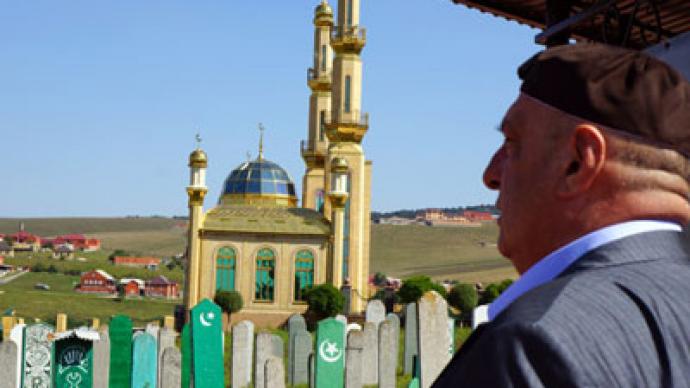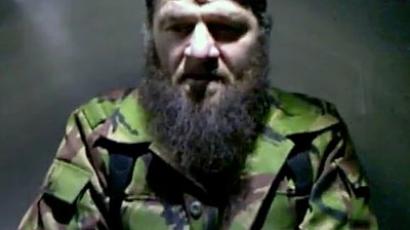Muslim Ghandist order or smuggler mafia? The life of the North Caucasus’ most secretive fellowship

“The Batal folk? They won’t talk to you. First of all, you’re a stranger. Secondly, you’re a woman,” my local friends warned, describing the fellowship as a “sect” that had subdued local businesses and regular seized private cars from owners at will.
This description is an improvement in its own right, since in the past, the Batal community used to be painted as a “mafia” with a penchant for dancing in cemeteries at night. They live in Russia’s southern republic of Ingushetia, in the Caucasus Mountains, and follow the rules established by Batal-Haji Belkhoroyev, a sheikh from the 19th century.They don’t like revealing their lifestyle and traditions even to other Ingush, providing fertile ground for speculation.Fog of gossipThere are essentially two parallel realities that exist in Russia’s North Caucasus. There are the images painted by media reports coming from both pro-government and opposition press. And then there is also an intricate cobweb of extensive family ties and religious affinities, all screened from the eyes of strangers.In a dualist environment like that, rumors become an exceptionally powerful phenomenon, whether they’re harrowing or hilarious things that get passed around. Considering the extreme diversity of Russia’s Caucasian communities, the mish-mash of rumors is essentially the only thing they all share.
One of the most popular rumors that people in Ingushetia like to impress travelers with is a tale told by way of vague hints, of an insulated religious sect of car thieves. A respected local man told me in all earnest, “They have homes where the floor can be lifted with a winding mechanism, and the basement goes down several levels – and they’re all packed with stolen cars, expensive luxury cars that is. You don’t believe me? I know people who saw it with their own eyes.”An earlier tale would pass the same community for a gang of arms smugglers.“The folks have seen household basements turned into armories, complete with grenade launchers. They say there was even a tank in stock,” another local told me, while admitting he hadn’t seen it himself. “All you have to do is ask the right person about it, and they’ll take you right to their doorstep.”Fellowship capital“Make sure you don’t refer to them as ‘Batlaks’, as some people call them,” he warns me. “They consider it an insult. The only name they accept is Batal-Hajians.”The township of Surkhakhi is located on the shallow slopes of a foothill. Its houses are fenced off from the street with 2- or 3-meter brick walls, crowned with bartizans and decorated with carvings.
We are greeted at a wide-open gate of tilted iron by Yusup Mutsolgov, a tall, handsome man with the bearing of a young athlete and a sheepskin hat on his gray head. He is one of the fellowship’s most authoritative elders.Deep inside the house, there is a shuffle of moving figures and the ringing of childish voices. The only people to join us, however, are Yusup’s wife and elder son, who are themselves apparently curious to hear stories about the fellowship.In the many hours that we spend talking, the two of them neither speak a word nor take a seat: that is the decorum in these parts.About Batal-HajiBatal-Haji Belkhoroyev was the founder of the brotherhood. He was born in either 1821 or 1824, and died in 1914. After the North Caucasus tribes were defeated in the Caucasian War (also known as the Russian conquest of the Caucasus, 1817-1864), at which time the sheikh was already 40 years old, he started preaching about morality and introduced a special way of praying.It is called a loud zikr – men form a circle and start praising Allah, stamping their feet and clapping. “We don’t run in circles or go into a trance,” Yusup says.In 1868, after four years of preaching, Russia’s imperial authorities decided to send Bathal-Haji into exile for several months to an island in the Caspian Sea. In 1891, he was confined to the small town of Kozelsk near Kaluga in Western Russia for another seven years. In 1911, Batal-Haji was handed down one more term in Kozelsk, where he died in 1914. His body was brought back to Surkhakhi and buried there.
At the height of World War II in 1944, Joseph Stalin ordered the entire Ingush people to be displaced and exiled to Central Asia on charges of “collaboration with the Nazis.” Surkhakhi was found “unfit for redevelopment” and subsequently razed – its gardens chopped down and tombstones used to build cow sheds.Sheikh Batal-Haji’s grave was the only site that looters could not penetrate, and didn’t have the nerve to blast open with dynamite.After 13 years in exile, the Soviet government allowed the Ingush people to return to their homes. The first thing Batal-Haji’s followers did upon coming home was to restore his gravesite and recover the community’s main relics: the sheikh’s personal belongings, his books, his saber, and his Koran, which the elders had buried shortly before eviction in 1944.What doesn’t kill you makes you stronger“I’ve visited Kozelsk, the place of the sheikh’s exile, 20 times,” says Yusup. His great-grandmother volunteered to join the sheikh in his exile. It is through Yusup’s great-grandmother that the Mutsolgovs joined the fellowship.Batal-Hajians tracked down the house where the sheikh and his family lived and acquired it, although all they had to base their search on was a single 1913 photograph and descriptions.“We bought it from two families who had owned it, and we barely had time to take a picture before it simply fell apart, it was so old,” says Yusup.“We spent a lot of time thinking why they chose the rural area around Kaluga to be the exile destination – both for Imam Shamil and Chechen and Ingush sheikhs. We have come to think that is was because Christian traditions were very strong in that area and the authorities thus wanted to prevent our sheikhs from spreading the teachings of Islam throughout Russia,” continues Yusup.
The Optina Hermitage monastery, one of the most prominent centers of the Orthodox Christianity is located nearby Kozelsk. Dostoyevsky wrote about it in his novel The Brothers Karamazov. He, along with Gogol, Tolstoy, and philosopher Vladimir Solovyev visited the monastery. And so did sheikh Bathal-Haji, who spent a lot of time talking with the monks and priests.Batal-Hajians have passed on stories through generations of how the sheikh healed people through prayer and made accurate predictions of people’s lives and historical events.“Just look at those ethnic groups in the North Caucasus who have not had the holy teachers or Sufis, they have adopted a lifestyle that is alien to the North Caucasus, they drink vodka at funerals and weddings,” says Yusup. He has the tact to avoid calling it “Russification”, as the sheikh himself never labeled this vice – excessive drinking – a Russian habit.Fellowship rulesYakub Belkhoroev recites the rules that all the members of the Batal-Haji brotherhood follow, “No drinking, smoking, breaking one’s oaths, committing adultery, appropriating other people’s belongings, lying, revealing other people’s secrets. All must follow the Five Pillars of Islam. All must preserve the unity of the Muslim ummah [the Diaspora or pan-Islamic state – ed.] and solve any issues according to Sharia.”“Now everything is more liberal, unlike back when the times were harsh – it was stricter then. In Imperial and Soviet times, there wasn’t a single Communist, member of Komsomol, policeman, judge, prosecutor or mullah among the members of Batal-Haji brotherhood, and there aren’t any now. There were cases when schoolchildren faced expulsion because they didn’t join ideological organizations. The Batal-Haji have never taken public positions. They could be doctors, teachers, engineers, but never policemen. The principle remains,” Yusup says.The members of the Batal-Haji brotherhood are prohibited from taking public office, but allowed to be elected. For example, last year sheikh Batal-Haji’s grandson, Yakub Belkhoroev, was elected mayor of Ingushetia’s capital Magas. Despite all the names and nicknames spin doctors called him during the campaign, he won the election.
There are also brotherhood rules that apply to food. The Batal-Haji can only eat the meat of livestock they personally butcher. The spring that the sheikh found in the village is considered to have a healing effect.“Our wrestler Nazyr Mankiev won a gold medal in the Beijing Olympics. His matches happened to be during sawm, that is fasting in the holy month of Ramadan. He managed to bring dried meat with him, even though it wasn’t allowed. What would he have been eating there otherwise?” Yakub asks.“After the sheikh’s death no one can join the Batal-Haji brotherhood, only via marriage. We have the highest birthrate among all fellowships. Fathers initiate their sons; every boy learns all the rules at the age of seven. Our daughters can only marry a member of the brotherhood, while our sons are allowed to marry women from other brotherhoods. There are about 25-30,000 members in our brotherhood,” Yakub tells me. The number he mentions means that the Batal-Haji make up about 6-8 per cent of the Ingush population. The official statistics contain a figure that’s half or one-third as big.
How myths are createdI don’t straightforwardly ask about the rumors concerning illegal car and arms trade – it is not the done thing here, especially when the question is about something shameful. But the elders understand what I’m trying to ask. No one jumps at the opportunity to deny the rumors, as it is considered undignified. So the conversation continues in an abstract manner.“Our rules forbid any kind of deceit, even the everyday sort, regardless of whether you are dealing with a Muslim or a Christian. If you steal from a Russian and he doesn’t forgive you, you’ll be condemned to hell with that thing you stole.” This was the end of our conversation about stolen cars. Later, in private, I hear stories about some of the Batal-Haji members who disobeyed the powerful families and provided aid to the militants. It often happened because they couldn’t break the rules of hospitality and ignore the principles that govern their lives, and for this they became the target of various rumors: that they steal cars and smuggle weapons; that they’ve bought up all gas stations in the area; that their hamlet is really a tribal stronghold fitted for perimeter defense, and so on.
There is some truth to the latter rumor: once, [leader of Russia’s Chechen Republic] Ramzan Kadyrov’s special forces tried to arrest a person from Surhahi, but the villagers prevented them. By the way, the Batal-Haji brotherhood is no exception – every man in the Caucasus has a weapon.“Every incident like that led to various stories spreading. They say we’re a powerful and closed society, have you heard? Our sheikh understood even animals, he went into the forest to pray and the wolves never touched him. He went into his last exile before the order even arrived. He took his family and some food, and went to Kozelsk,” Yakub shows me the sheikh’s portrait that the brotherhood bought from one of the most expensive Russian artists.He draws back the drape that covers the portrait and tells me to come closer to the painting and look at the sheikh, saying, “See, the artist understood our principles and painted the portrait in such a way that wherever you go, the Teacher watches you.”
Nadezhda Kevorkova, RT














